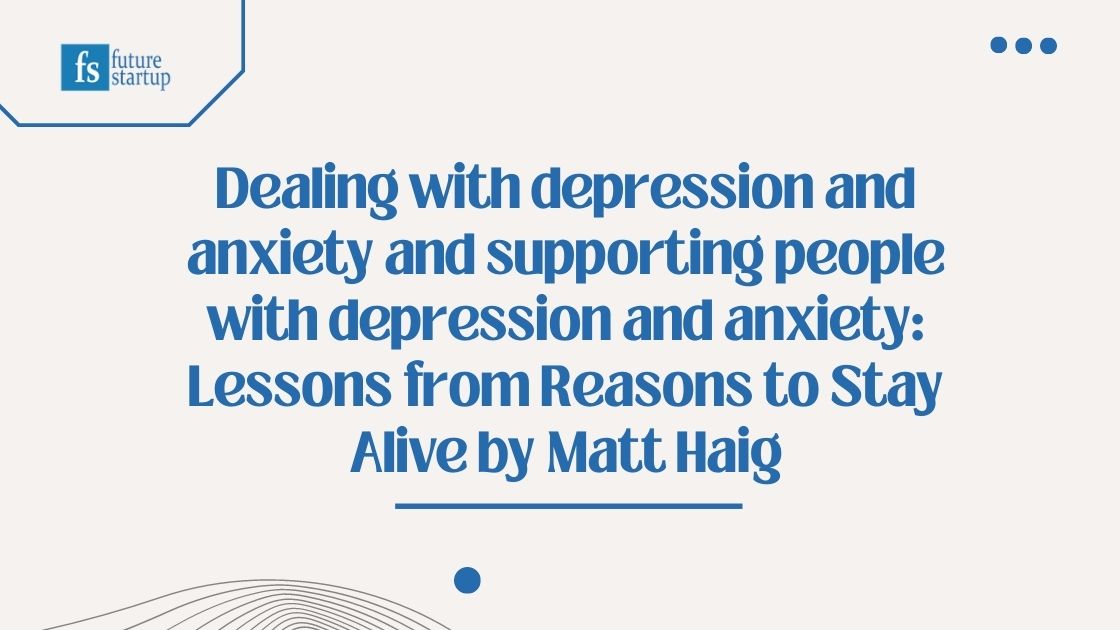Reasons to Stay Alive is a novel and memoir written by novelist Matt Haig. The book is based on his experiences of living with depression and anxiety disorder.
The book intends for people to never lose faith and support. In the book, he encourages us to enjoy the little joys and happiness that life brings, and tells us that there are still plenty of opportunities to enjoy life. He tries to convince people that time can heal, there is light at the end of the tunnel, even if it can’t be seen.
“Depression is always smaller than you, even when it feels vast,” writes Matt in the book. “It operates within you, you do not operate within it. It may be a dark cloud passing across the sky, but if that is the metaphor you are the sky. You were there before it. And the cloud can’t exist without the sky, but the sky can exist without the cloud”.
This is an excerpt from the book. I hope you enjoy it and find it useful.
Reasons to stay alive
Life is short but still, it's very precious to every human. And there are tons of reasons to live the life fully that you have. Here are some reasons from the book:
- You are on another planet. No one understands what you are going through. But actually, they do. You don’t think they do because the only reference point is yourself. You have never felt this way before, and the shock of the descent is traumatizing you, but others have been here. You are in a dark, dark land with a population of millions.
- Things aren’t going to get worse. You want to kill yourself. That is as low as it gets. There is only upwards from here.
- You hate yourself. That is because you are sensitive. Pretty much every human could find a reason to hate themselves if they thought about it much as you did. We’re all total bastards, us humans, but also totally wonderful.
- So what, you have a label? “Depressive”. Everyone would have a label if they asked the right professional.
- That feeling you have, that everything is going to get worse, is just a symptom.
- Minds have their own weather systems. You are in a hurricane. Hurricanes run out of energy eventually. Hold on.
- Ignore stigma. Every illness had a stigma once. We fear getting ill, and fear tends to lead to prejudice before information. Polio used to be erroneously blamed on poor people, for instance. And depression is often seen as a ‘weakness’ or personality failing.
- Nothing lasts forever. This won’t last. The pain tells you it will last. Pain lies. Ignore it. Pain is a debt paid off with time.
- Minds move. Personalities shift. To quote myself, from The Humans, “your mind is a galaxy. More dark than light. But the light makes it worthwhile. Which is to say, don’t kill yourself. Even when the darkness is total. Always know that life is not still. Time is space. You are moving through that galaxy. Wait for the stars”.
- You will one-day experience joy that matches this pain. You will cry euphoric tears at the Beach Boys, you will stare down at a baby’s face as she lies asleep in your lap, you will make great friends, you will eat delicious foods you haven’t tried yet, you will be able to look at a view from a high place and not assess the likelihood of dying from falling. There are books you haven’t read yet that will enrich you, films you will watch while eating extra-large buckets of popcorn, and late-night conversations and laughing until it hurts. Life is waiting for you. You might be stuck here for a while, but the world isn’t going anywhere. Hang on in there if you can. Life is always worth it.
How to support someone with depression and anxiety
They said, “those who are happiest are those who do the most for others” and that is the ultimate advice for any living human. Because only humans can be the source of happiness for other humans. So be kind, and help others in their hard times. The book offers a ton of useful suggestions regarding how to support someone with depression and anxiety going through a difficult situation people. Following is a list of suggestions from the book:
- Know that you are needed, and appreciated, even if it seems you are not.
- Listen
- Never say ‘pull yourself together’ or ‘cheer up’ unless you are also going to provide detailed, foolproof instructions.
- Appreciate that it is an illness. Things will be said that aren’t meant.
- Educate yourself. Understand, above all, that what might seem easy to you, going to a shop, for instance, might be an impossible challenge for a depressive.
- Don’t take anything personally, any more than you would take someone suffering from the flu or chronic fatigue syndrome or arthritis personally. None of this is your fault.
- Be patient. Understanding it isn’t going to be easy. Depression ebbs and flows and moves up and down. It doesn’t stay still. Do not take one happy/ bad moment as proof of recovery/ relapse. Play the long game.
- Meet them where they are. Ask what you can do. The main thing you can do is just be there.
- Relieve any work/life pressure if that is doable.
- Where possible, don’t make the depressive feel weirder than they already feel. Three days on the sofa? Haven’t opened the curtains? Crying over difficult decisions like which pair of socks to wear? So what. No biggie. There is no standard normal. Normal is subjective. There are seven billion versions of normal on this planet.
Note: I have published a full-length review on the Reasons to Stay Alive. You can read it here.

